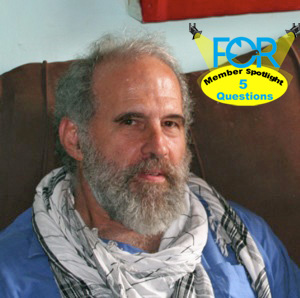 What inspired you to become a FOR member?
What inspired you to become a FOR member?
I’d heard about FOR during the Vietnam war – I believe it was right after the Kent State incidents. I did not become a member until I attended an FOR conference at Seabeck, 2008 or 2009. I was introduced to the National Council, and shortly thereafter I started to make trips to Shadowcliff in New York [FOR’s national headquarters from 1956-2017] as one of the new representatives from the Pacific Northwest. I met Mark Johnson, Ethan Vesely-Flad, and the basement archives, and I was hooked.
What is your proudest FOR moment?
My proudest FOR moment may have been at an installation of the Iraq Memorial to Life. I was looking up at the group on the adjacent boardwalk in Sandy Hook, New Jersey, and realizing that the elderly man who had just come to join us was George Houser. A few years later he welcomed me to his bedside, at 99 years old, were he spoke to me about the rest of his life.
When did you find your peace witness most challenged and how did you respond?
This would have been in Afghanistan with the Afghan Peace Volunteers, during our witness of the war while in Bamiyan Center, one of the most peaceful places in Afghanistan. The visit made it possible for us to hear the fuller, truly sad story of U.S. involvement. You could see the trauma in each of the faces of those in the markets and streets of Bamiyan Center. It was not PTSD! It is much worse. There is/was no “Post” about it. And, Afghanistan is still a U.S. war zone – 20 years, next October.
There comes a time there when you realize you are always and everywhere known to be an American. At times an unsettling feeling: once in a side room of the Kabul airport surrounded by elder Taliban, when from the voice inside your head you hear, “place one foot in front of the other.” Then it happened again at dusk on the walkways of Bamiyan Center. And it sinks in deeper, the understanding that not everyone wants you here; and at that moment you hope for that combination of confidence and humility and empathy that will get you beyond these most uncomfortable moments.
What is the most critical issue we’re facing right now?
The most critical situation that we now face is in the cross-hairs of the intersection of climate disruption and the overwhelming Ill effects of the domination code that is inbred in our culture. We are surrounded by the answer, it is the indigenous ecological wisdom regarding how to live on Mother Earth. It appears that there is an opportunity, November 3, when the winner-take-all economic framework can again be dismantled (FDR) to somehow address systemic injustice. FOR will be there in its best ways possible.
What song, book, movie, etc. is inspiring you/ giving you hope in this moment?
The 2018 PBS series “Native America” lays out so much about the ecological wisdom of the Indigenous people of the Americas it should be available to everyone in FOR, and beyond. Regarding books: anything of Naomi Klein’s, or Joanna Macy’s. For those with a little more time: Vine DeLoria Jr., or Noam Chomsky.







